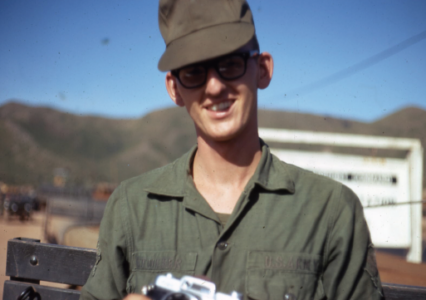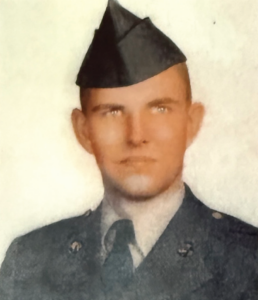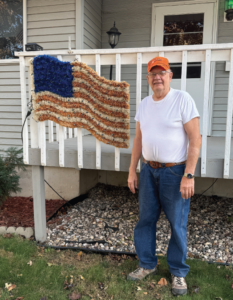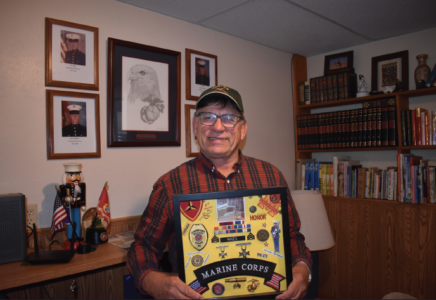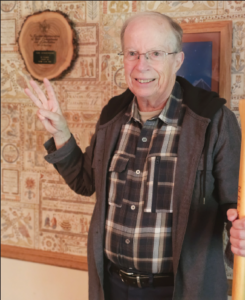Keeping the power on: Larry Stueber’s year as a generator specialist in Vietnam
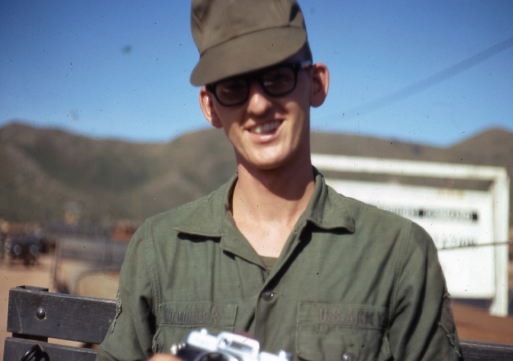
A photo of Larry Stueber taken in Vietnam when he was 20 years old. In the photo, Stueber was waiting on a truck to take him back to his company after repairing a generator.
NEW ULM — When Lawrence “Larry” Stueber received his draft notice in 1966, the 20-year-old New Ulm native was working as a paint salesman at Cook’s Paints. He didn’t know much about electricity, but the Army did. It needed generator repair specialists, and it trained him to become one.
At Fort Belvoir, Virginia, Stueber completed six months of intensive electrical fundamentals training that covered everything from circuitry to complex power systems. The instruction was rigorous and precise, and the Army kept him stateside for another year to gain hands-on experience before assigning him overseas. By the time he deployed to Vietnam in January 1967, Stueber had mastered the Army’s approach to power generation–knowledge that would prove essential in the field.
The journey to Southeast Asia began under the Golden Gate Bridge as Stueber’s troop ship departed California. About 200 soldiers from the 98th Company spent 27 days crossing the Pacific, sleeping in canvas bunks stacked three or four high. Meals were served cafeteria-style on stainless steel trays, and soldiers ate standing up because the ship rocked too much to keep plates on tables.
“It was a very boring trip,” Stueber said, but it gave him time to think about the job ahead.
When he landed near Qui Nh?n, Vietnam, the reality of the war’s logistics became clear. Soldiers were living in tents, with barracks still under construction. The tropical heat was relentless.
“Terrible hot,” he recalled. “No air conditioning. You just sweat.”
As a generator specialist, Stueber’s assignment was straightforward but critical: keep the power on. Each Army company generated its own electricity because there was no public grid. The generators
ran nonstop–24 hours a day, seven days a week–and were shut down only briefly for oil and water checks. If one failed, communications, refrigeration, and operations stopped immediately.
Stueber’s shop operated under large canvas tents surrounded by rows of generators waiting for repair. Ordering replacement parts took time since everything had to be shipped from the United States.
“We had a hard time getting parts,” he said.
“They had to come from the States.”
His job required technical accuracy and independence.Once he achieved the rank of specialist five,
the Army began flying him by helicopter to a remote bases whenever a generator broke down. He traveled alone, carrying his tools, and repaired 15- and 30-kilowatt units that powered communication posts and command sites.
“They’d fly me wherever a generator was out,” he said. “I’d fix it, test it under load, and get it running again.”
One evening, he was called to repair a 100-kilowatt generator in an area being sprayed from the
air. Focused on the job, he didn’t think much about it until years later.
“I figured out that was Agent Orange,” Stueber said. Although he never saw combat, he understood the discipline required to serve effectively.
“Listen to your upper sergeants and do as they say, because if you don’t, you’re just making it tough,” he said. “If you do what they tell you, they’ll let you go. Those who didn’t, wound up doing push-ups.”
The experience taught him patience, precision,and accountability–skills that stayed with him long after he returned home.”The Army taught me discipline,” he said. “You learn to stick with it and
finish the job.”
His tour lasted nearly a year. By late November 1967, Stueber boarded a flight out of Vietnam,
traveling through Washington State before heading home to Minnesota. The trip home took only hours compared to the 27-day voyage out, and he was ready for civilian life again.Using the GI Bill, he completed three correspondence courses in compressor control, refrigerant tubing, and general refrigeration principles. Combined with his Army electrical training, the courses gave him a technical foundation for a lifelong career.
Stueber soon reconnected with his hometown community, where he built his post-service life. In 1973, he married Mardell Ries. The couple raised two children, Heidi and Darren, and remained married for 52 years. They shared six grandchildren and a quiet life in New Ulm. Mardell passed away in July 2025.
Friends and family say the discipline and reliability he learned in the Army carried through every part of his life. Whether maintaining power under wartime conditions or handling everyday challenges, he approached work and family with the same consistency he learned as a generator specialist.
Looking back, Stueber credits the Army for shaping his character and technical ability.
“I wouldn’t have been able to do anything electrical without the help of the Army,” he said. “They taught me everything I needed to know.”
For one year in Vietnam, the young man from New Ulm helped keep the lights on and the radios running for soldiers spread across the region. The skills he learned–attention to detail, discipline, and self-reliance–never left him.
“I had a good job,” Stueber said simply. “You did what you had to do. And you made sure it worked.”

